Wei Qi Leong
SEA-LION: Southeast Asian Languages in One Network
Apr 08, 2025Abstract:Recently, Large Language Models (LLMs) have dominated much of the artificial intelligence scene with their ability to process and generate natural languages. However, the majority of LLM research and development remains English-centric, leaving low-resource languages such as those in the Southeast Asian (SEA) region under-represented. To address this representation gap, we introduce Llama-SEA-LION-v3-8B-IT and Gemma-SEA-LION-v3-9B-IT, two cutting-edge multilingual LLMs designed for SEA languages. The SEA-LION family of LLMs supports 11 SEA languages, namely English, Chinese, Indonesian, Vietnamese, Malay, Thai, Burmese, Lao, Filipino, Tamil, and Khmer. Our work leverages large-scale multilingual continued pre-training with a comprehensive post-training regime involving multiple stages of instruction fine-tuning, alignment, and model merging. Evaluation results on multilingual benchmarks indicate that our models achieve state-of-the-art performance across LLMs supporting SEA languages. We open-source the models to benefit the wider SEA community.
Global MMLU: Understanding and Addressing Cultural and Linguistic Biases in Multilingual Evaluation
Dec 04, 2024



Abstract:Cultural biases in multilingual datasets pose significant challenges for their effectiveness as global benchmarks. These biases stem not only from language but also from the cultural knowledge required to interpret questions, reducing the practical utility of translated datasets like MMLU. Furthermore, translation often introduces artifacts that can distort the meaning or clarity of questions in the target language. A common practice in multilingual evaluation is to rely on machine-translated evaluation sets, but simply translating a dataset is insufficient to address these challenges. In this work, we trace the impact of both of these issues on multilingual evaluations and ensuing model performances. Our large-scale evaluation of state-of-the-art open and proprietary models illustrates that progress on MMLU depends heavily on learning Western-centric concepts, with 28% of all questions requiring culturally sensitive knowledge. Moreover, for questions requiring geographic knowledge, an astounding 84.9% focus on either North American or European regions. Rankings of model evaluations change depending on whether they are evaluated on the full portion or the subset of questions annotated as culturally sensitive, showing the distortion to model rankings when blindly relying on translated MMLU. We release Global-MMLU, an improved MMLU with evaluation coverage across 42 languages -- with improved overall quality by engaging with compensated professional and community annotators to verify translation quality while also rigorously evaluating cultural biases present in the original dataset. This comprehensive Global-MMLU set also includes designated subsets labeled as culturally sensitive and culturally agnostic to allow for more holistic, complete evaluation.
SEACrowd: A Multilingual Multimodal Data Hub and Benchmark Suite for Southeast Asian Languages
Jun 14, 2024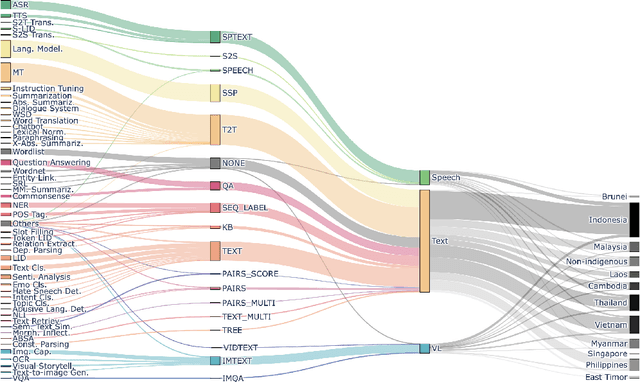
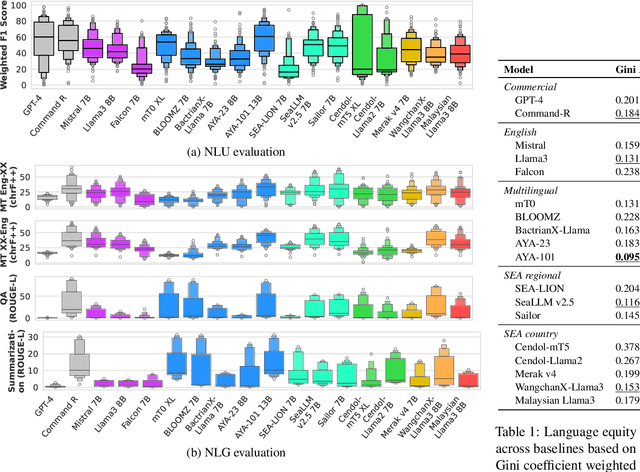
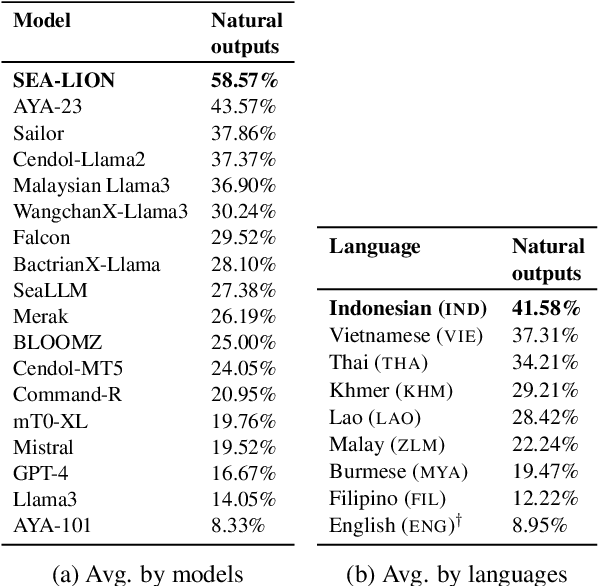
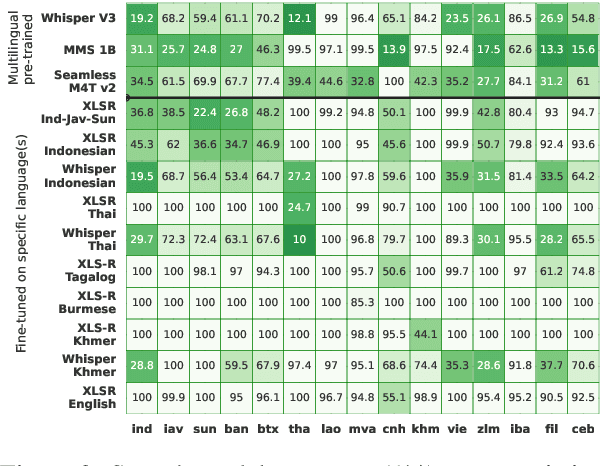
Abstract:Southeast Asia (SEA) is a region rich in linguistic diversity and cultural variety, with over 1,300 indigenous languages and a population of 671 million people. However, prevailing AI models suffer from a significant lack of representation of texts, images, and audio datasets from SEA, compromising the quality of AI models for SEA languages. Evaluating models for SEA languages is challenging due to the scarcity of high-quality datasets, compounded by the dominance of English training data, raising concerns about potential cultural misrepresentation. To address these challenges, we introduce SEACrowd, a collaborative initiative that consolidates a comprehensive resource hub that fills the resource gap by providing standardized corpora in nearly 1,000 SEA languages across three modalities. Through our SEACrowd benchmarks, we assess the quality of AI models on 36 indigenous languages across 13 tasks, offering valuable insights into the current AI landscape in SEA. Furthermore, we propose strategies to facilitate greater AI advancements, maximizing potential utility and resource equity for the future of AI in SEA.
ThaiCoref: Thai Coreference Resolution Dataset
Jun 10, 2024
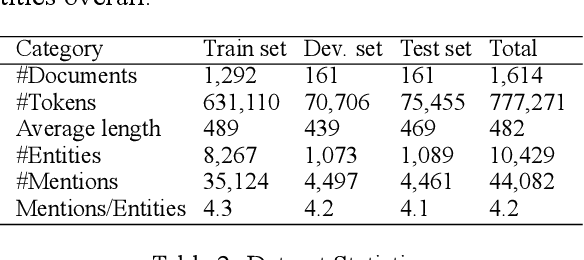


Abstract:While coreference resolution is a well-established research area in Natural Language Processing (NLP), research focusing on Thai language remains limited due to the lack of large annotated corpora. In this work, we introduce ThaiCoref, a dataset for Thai coreference resolution. Our dataset comprises 777,271 tokens, 44,082 mentions and 10,429 entities across four text genres: university essays, newspapers, speeches, and Wikipedia. Our annotation scheme is built upon the OntoNotes benchmark with adjustments to address Thai-specific phenomena. Utilizing ThaiCoref, we train models employing a multilingual encoder and cross-lingual transfer techniques, achieving a best F1 score of 67.88\% on the test set. Error analysis reveals challenges posed by Thai's unique linguistic features. To benefit the NLP community, we make the dataset and the model publicly available at http://www.github.com/nlp-chula/thai-coref .
Thai Universal Dependency Treebank
May 13, 2024Abstract:Automatic dependency parsing of Thai sentences has been underexplored, as evidenced by the lack of large Thai dependency treebanks with complete dependency structures and the lack of a published systematic evaluation of state-of-the-art models, especially transformer-based parsers. In this work, we address these problems by introducing Thai Universal Dependency Treebank (TUD), a new largest Thai treebank consisting of 3,627 trees annotated in accordance with the Universal Dependencies (UD) framework. We then benchmark dependency parsing models that incorporate pretrained transformers as encoders and train them on Thai-PUD and our TUD. The evaluation results show that most of our models can outperform other models reported in previous papers and provide insight into the optimal choices of components to include in Thai dependency parsers. The new treebank and every model's full prediction generated in our experiment are made available on a GitHub repository for further study.
BHASA: A Holistic Southeast Asian Linguistic and Cultural Evaluation Suite for Large Language Models
Sep 19, 2023



Abstract:The rapid development of Large Language Models (LLMs) and the emergence of novel abilities with scale have necessitated the construction of holistic, diverse and challenging benchmarks such as HELM and BIG-bench. However, at the moment, most of these benchmarks focus only on performance in English and evaluations that include Southeast Asian (SEA) languages are few in number. We therefore propose BHASA, a holistic linguistic and cultural evaluation suite for LLMs in SEA languages. It comprises three components: (1) a NLP benchmark covering eight tasks across Natural Language Understanding (NLU), Generation (NLG) and Reasoning (NLR) tasks, (2) LINDSEA, a linguistic diagnostic toolkit that spans the gamut of linguistic phenomena including syntax, semantics and pragmatics, and (3) a cultural diagnostics dataset that probes for both cultural representation and sensitivity. For this preliminary effort, we implement the NLP benchmark only for Indonesian, Vietnamese, Thai and Tamil, and we only include Indonesian and Tamil for LINDSEA and the cultural diagnostics dataset. As GPT-4 is purportedly one of the best-performing multilingual LLMs at the moment, we use it as a yardstick to gauge the capabilities of LLMs in the context of SEA languages. Our initial experiments on GPT-4 with BHASA find it lacking in various aspects of linguistic capabilities, cultural representation and sensitivity in the targeted SEA languages. BHASA is a work in progress and will continue to be improved and expanded in the future. The repository for this paper can be found at: https://github.com/aisingapore/BHASA
 Add to Chrome
Add to Chrome Add to Firefox
Add to Firefox Add to Edge
Add to Edge